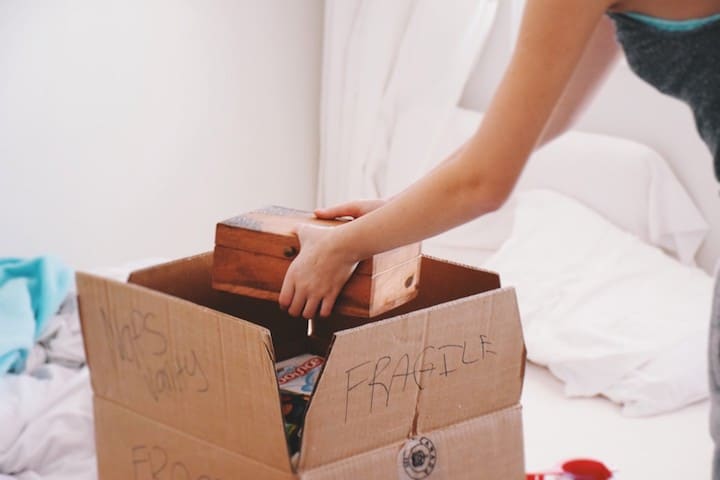The music magazines you won’t read again. The “just in case” tangle of old chargers in the drawer. The garage.
Admit it: You’ve got stuff. So how do you clear the clutter? You may have heard about the KonMari method, where you keep whatever gives you joy and toss the rest, and do it all at once. But what about the stuff you feel you have to keep — the expensive, the meaningful, the gift from great aunt Gertrude? And what if dealing with everything you own right now feels brutal and time-consuming?
That’s where the Swedish art of “death cleaning” comes in. The concept, called döstädning in Sweden and popularized by Margareta Magnusson’s bestselling book The Gentle Art of Swedish Death Cleaning, suggests the best way to clean is to imagine how your relatives would deal with your stuff if you were to die, and to work through your possessions gradually.
Sound morbid? To an extent it is — and that’s the point. By thinking of how your relatives will deal with your stuff in the future, you keep what really matters. Not only do you make it easier for your loved ones down the line, but Magnusson believes that clearing your space of the clutter that doesn’t matter can actually make you enjoy your life more now.
No matter how old you are, incorporating the process of Swedish death cleaning into your life — Swedes begin long before death is on the horizon — can leave your home tidier and more pleasant, and can make those What the *&*&* do I do with this? questions much easier to answer.
What is Swedish death cleaning?
Going through a loved one’s books and photos can be a cathartic, memory-stirring part of grieving, but facing a vast array of clothes, books, mementos, kitchen paraphernalia, and unpleasant surprises is overwhelming and stressful. The thing to remember, as Magnusson puts it in her book, is that “A loved one wishes to inherit nice things from you, not all things.”
Death cleaning is “gentle” because it’s an intentionally slow process – the idea is to do it bit by bit, over time. You shouldn’t feel like you have to declutter everything all at once, but you should have an idea of how psychologically attached you are to the stuff you keep.
How to get started
Want to try the döstädning strategy in your own life? First, start with the stuff you may not have emotional attachment toward. Magnusson suggests starting with clothes, as those are fairly easy to assess: if you just don’t wear it, it’s unlikely to come back into fashion, or it never really was in the first place, out it goes. Those cords and cables in the drawer? If you don’t know what machine they work with, how would a relative possibly know? Toss ‘em.
Next, look at what you actually use. Have an ugly but functional coffee table? It’s fine to keep it until you have a replacement in mind — or another place to put magazines, paperwork, or whatever else seems to accumulate.
Finally, know that döstädning is meant to be a lifelong process. For example, photos should be tackled last – they tend to be slow going because of the memories stirred up. Luckily, their outsized emotional weight is in inverse proportion to their actual size, which is another reason why it’s fine to leave them until later.
[testiomonial]
It’s okay to keep things for yourself
But what about things you do want to keep that you know your relatives won’t care about? For these Magnusson recommends having a box marked “throw away” containing items that are important to you but worthless to anyone else. Are you the only theater buff or baseball fan in the family? Now you know where to put your collection of ticket stubs. This box is also central to one of Magnusson’s more humorous yet serious pieces of advice: “There’s no sense in saving things that will shock or upset your family after you are gone.” Sex toys, letters from exes, private photos and diaries are just some of the things you may wish to put in the “throw away” box. Whether it needs a lock depends on how good your family is at following instructions.
Think of the future to enjoy the present
Get rid of things you don’t really want for a more spacious, tidier home. If your possessions are organized, you don’t waste time and energy looking for them. Viewing your things with an eye to getting rid of them also makes you mindful about what you buy in the first place, which is hard to do in a world where almost anything can be delivered to your door with a tap on your smartphone. Becoming a more thoughtful consumer is its own reward, but it takes on a deeper meaning when you link it to Döstädning: if you death clean to improve things for your kids when you’re gone, and that leads you to think about overconsumption and the effect it has on the world they will inherit, there’s value there which goes beyond extra closet space.
Keep things without guilt or clutter
Death cleaning is about getting rid of stuff to spare people emotional pain, but of course, there are things you’re obliged to keep for the same reason – terrible, unwanted presents from people who may visit your home, and would be distraught to learn that you had not kept their gift. For these items, the Swedes have what is called a fulskap, or “cabinet for the ugly.” You keep bad gifts in it and bring them out when the friend or relative who gave them drops ‘round. When death cleaning, you obviously can’t label that cabinet with “throw away,” but if your nearest and dearest truly understand you, they’ll know what to do with its contents when the time comes.
Excess stuff can separate you from the things that matter
A garage full of clutter may seem like NBD, but that stuff may be mentally and physically weighing you down. By getting rid of the things that lack meaning, you’re opening up your life for more things that matter (mostly meaning experiences, not buying more stuff). Sounds a little heady (I mean, don’t you just want a clean garage for once?) but the point isn’t to use this philosophy for a one-time weekend cleanout. It’s to incorporate this philosophy into your everyday life. As you gradually and methodically go through your things you’ll end up with possessions you (and your heirs) want and a cleaner, clutter-free pad.
Michael Davis is a freelance writer and editor who has covered everything from fashion and music to parenting, work, and finance. He has been a chef, restaurateur and record label owner.





